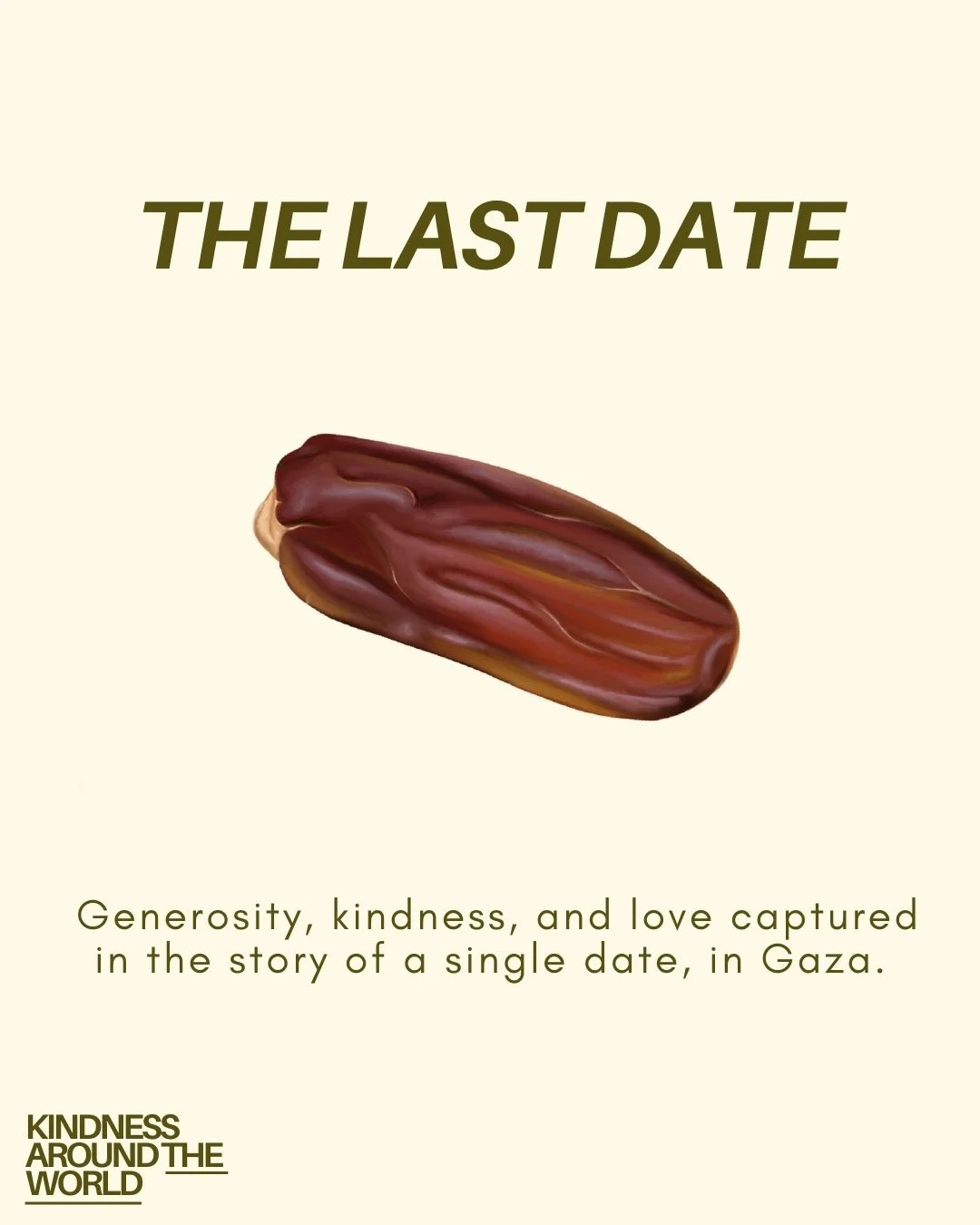The Last Date
A few weeks ago I started a series on my socials called “Kindness Around the World”; each Friday I planned to post how kindness is practiced in a different culture or country. The first Friday I posted about Caffè Sospeso, the Neapolitan tradition of ‘suspended coffee’, when a person buys two coffees, drinks one and the second is ‘suspended’ for someone who needs it. The following Friday I shared about Omotenashi, the Japanese culture of selfless hospitality when people anticipate the needs of others and serve them sincerely without expecting anything in return; wearing a mask to prevent others from illness or giving neighbors laundry detergent as they begin a construction project are examples.
But after a couple of weeks I took a pause, I just didn’t have the heart to post about gestures of kindness when Israel is committing a genocide in Palestine. It feels wrong to share anything joyful when there is unbelievable anguish and suffering.
Then last week I came across a story by Asem Alnabih, an engineer and PhD researcher in Gaza, that took my breath away. “The Story of the Last Date in Gaza” so beautifully reveals the innate kindness of the people of Palestine, their love of family, their sense of generosity, their dignity in the face of unfathomable pain. I reached out to Asem to ask permission to share his story with you. I didn’t expect to hear back, but within 10 minutes I got this reply: Thank you so much for your kind words. I’m truly glad that you liked my piece and I’d be very happy for you to share it in your humanKIND newsletter.
He ended his message: With deep gratitude from Gaza.
I was in tears, not only to feel connected to someone in Gaza, but at the thought that he was expressing gratitude. How can someone in Gaza express any kind of gratitude to me; I feel so shameful for not being able to do anything to alleviate their suffering. And yet, it simply reaffirms the essence of this story.
It is with immense honor, great respect, and truly deep gratitude that I share Asem’s story about the last date, originally published here (The Electronic Intifada, Aug 12, 2025).
It’s just a date. A single four-centimeter piece of dried fruit. But here in Gaza, where nothing comes easily and everything holds meaning, even a date becomes a symbol of endurance, sacrifice, and love.
I kept this date for six months. I’d found it and saved it for what I imagined would be the darkest days: the days when food would disappear from the shelves, when starvation would wrap itself around our lives, when sharing even a crumb would become an act of resistance.
Those days are now.
Like many Gazans, I love dates. My mother loves them too. A few weeks ago, I decided the time had come to part with my little treasure. I gave that single date to my mom. The next morning, she passed it on to my youngest sister, Nesma. And then Nesma gave it to our 2-year-old nephew Mo’men.
That one date, passed from hand to hand, became a quiet act of love in a world collapsing around us.
And so, when my mother gave Nesma the date, it was not just about food. It was a gesture of trust and hope: This is for you, my daughter. You need it more than I do.
And Nesma, in turn, chose to give it to Mo’men. He was born just two months before the war started and will grow up without his father, Moataz Rajab, who was killed during the genocide.
Moataz was a kind and educated man who earned his postgraduate degree in economics just one week before the war.
Mo’men will never remember his father’s voice. But at this moment, he received a date. And with it, he received a story he will hear again years later.
No one in my family wanted to eat the last date and deny someone else its sweetness. That’s who we are in Gaza, not just survivors, but givers. We give even what little we have left. Not because we are saints, but because love and dignity are all we can hold onto when everything else has been taken from us.
War can reveal the worst in people. Here in Gaza, it also brings out the best. Our streets are filled with pain and rubble, but also with kindness. Small gestures like passing along a date speak volumes about who we are.
Some may say it’s just a date. But I see in it the whole of Gaza’s story: deprivation and generosity, despair and defiance, the tight knots of family, and the unwillingness to surrender to cruelty. This date, saved and shared, is a tiny act of rebellion in the face of a system trying to strip us of everything, even the right to nourish our children.
In Gaza, we have redefined wealth. Wealth is not what you hoard but what you give away and is measured in the strength of the bonds that hold families and neighbors together. In a world that tries to reduce us to statistics, we have become storytellers. A single date carries the story of a family’s love, a child’s survival, a father’s absence and a people’s refusal to stop being human.
People ask how we survive. How we keep going when the bombs keep falling, when hunger gnaws at our children, when there is no certainty that we’ll live to see the next sunrise. My answer is: We survive for one another. We survive because in Gaza, no one wants to eat the last date. And we survive because we are all dreaming that a day might come soon with freedom and an abundance of dates.
The date is gone now, eaten by a child too young to know what it means. But the act remains, rippling outward like a pebble cast into water. It is in these ripples, in the stories we tell, in the way we refuse to forget, that Gaza lives on.
Asem’s story is now tied for first place as my all-time favorite personal story. He shares the spot with another Palestinian writer and another story about kindness—Naomi Shihab Nye’s “Gate A-4”, which I shared in this newsletter, Reaching for Hope. It’s a testament to the character, resilience, and brilliance of the people of Palestine, who have endured such hardship but retain their dignity and tell stories about kindness.
While it still feels incongruous to share about kindness practices when my heart is filled with so much heartache, Asem reminds me the value of such stories even (perhaps especially) in the most devastating of times. “In a world that tries to reduce us to statistics, we have become storytellers,” he says. “A single date carries the story of a family’s love, a child’s survival, a father’s absence and a people’s refusal to stop being human.”
So I’ve decided to resume my “Kindness Around the World” series with Asem’s beautiful story.
Perhaps a story about the culture of kindness will provide a moment of solace for someone feeling distraught. Perhaps it will create a ripple effect encouraging more compassion and empathy in the world. Maybe it will help someone see another—an ‘other’—in a different way. Or help someone hold on to hope.
Uncovering, sharing, and writing stories that reveal our common human bond is the main tool in my toolbox. I’ll keep at it in the hope that it can spread a bit of light.
With all my love, and with endless prayers for peace,
Salma
Thank you to so many of you who reached out with prayers for my mom, and who have been applying our nurse friend Geta’s penny illustration to deal with your own challenges (in my last newsletter Sometimes Life is Just Hard). A couple weeks ago, I walked over to the 5th floor of Sibley Hospital, from rehab where mom still is, because I wanted to read Geta the story I wrote about him. I’m always a little nervous sharing with the person I write about, as I hope I have done justice to their words. I waited till Geta had a pause in his schedule, and we walked around the corner to a sun-lit lounge. I started reading. Geta kept his head down, cupped his hands around his chin, and kept whispering ‘wow’, ‘wow’, ‘wow’. When I finished, he looked shocked, and gave me a warm hug. He was very generous with his words and the one he kept repeating was “breathtaking”; he couldn’t wait to share the story with his wife. Now I was the one smiling from ear to ear. 😊
This is newsletter #55. If you know anyone who might enjoy this newsletter, they can subscribe for free here. A few past newsletters:
Following a story’s thread home
My dad’s wisdom that guides me every day
“You will be someone’s ancestor”
How sharing my story is helping me heal
If the hat fits (This too has passed)
My soundtrack for proton radiation
The unexpected blessings of falling ill


